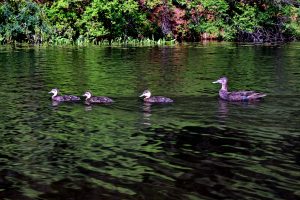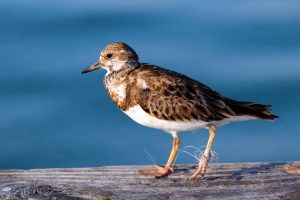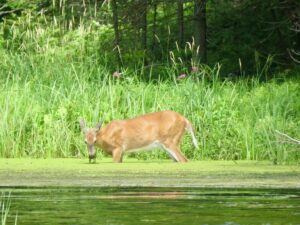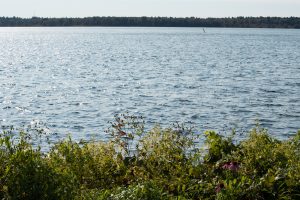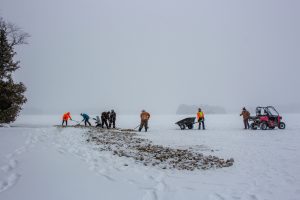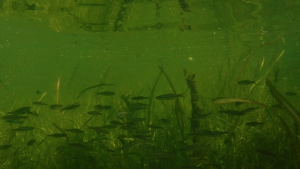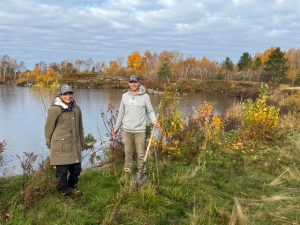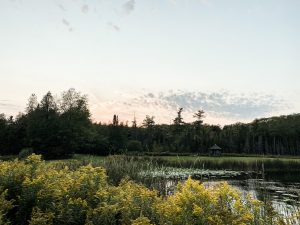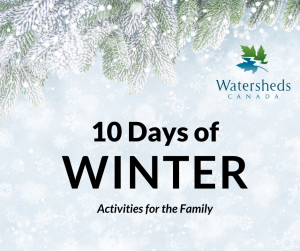by Christopher Dennison, Municipal Policy Intern The wellbeing of waterbirds is naturally intertwined with the health of shoreline and riparian ecosystems; the Ribbon of Life that surrounds our freshwater lakes and rivers. In North America, ecologists have posited that the riparian zone (the transitional area of land directly adjacent to a watercourse) supports a much higher diversity of nesting birds than uplands due to specific habitat characteristics (Sanders & Edge, 1998; ... Read More
The Haunting Truth of Ghost Gear and Shoreline Garbage
by Alana Coulombe, Education programs administrator You have finally landed the big catch and then snap! The line breaks. Frustrated, you take a moment to think about what could have been, the photos you could have taken. You think nothing of the interaction except that you need a new line and bob. This interaction is just one of millions that happen across Canada each year. It exemplifies the reality of many environmental issues: collectively, our actions are having a disastrous impact ... Read More
5 Webinars To Introduce You To Freshwater Management
by Paige Jessup, Climate Resilience Intern Our precious freshwater resources are coming under an increasing amount of pressure. Increasing urbanization and agriculture are encroaching on freshwater habitats. With a growing global human population, there is an increased demand for energy and resources meaning more pollution and obstructed water flows. Warming global temperatures are also causing changes in freshwater habitats. Freshwater ecosystems are critical to the future of our ... Read More
Economic Value of Green Infrastructure
by Chantal Lefevre, Natural Edge Regional Coordinator Green infrastructure, which encompasses a range of natural and semi-natural designed features, provides ecological, economic, and social benefits. It has gained increasing attention in recent years as a key strategy for achieving sustainable and climate change resilient environments. In Canada, where natural resources are abundant, green infrastructure has the potential to create significant economic value through various mechanisms, ... Read More
On the Ice Road to Restoration: Reflecting on our recent Walleye Habitat Enhancement Project
by Ty Fischer, Freshwater Health Coordinator, Watersheds Canada Though it covers Canadian lakes like a big frozen shield, the thick winter ice is not a hindrance to the delivery of Watersheds Canada’s Fish Habitat restoration projects – it is an asset. This is especially true for spawning bed enhancement projects, like the one that took place on February 6, 2025. On this day, the Watersheds Canada team met with 16 volunteers from Big Clear Lake Association, Shabot Obaadjiwan First Nation, ... Read More
5 Webinars to Introduce You to Freshwater Fish Conservation
by Paige Jessup, Climate Resilience Intern Freshwater fish are diverse and an important part of our economy. Not only are fish an important food source to people around the world but they are also important to our economies, providing jobs to over 60 million people (Orr, 2021). Fish are also an important part of our freshwater ecosystem; they contribute to the food chain by consuming other aquatic organisms, such as invertebrates and smaller fish, and they are also food for other ... Read More
A Love Your Lake success story: City of Greater Sudbury, Ontario
Article submitted by representatives from Nepahwin Lake Watershed Stewardship Group and Long Lake Stewardship Committee: In our collective desire to enjoy access to our City of Greater Sudbury, Ontario urban lakes, waterfronts have been manicured and hardscaped leading to the decline of lake water quality. Many of our urban lakes are suffering, with increased phosphorus levels, shoreline erosion, and algal blooms. There are simple solutions to harness nature’s ability to restore balance; one ... Read More
4 new resources to help protect our wetlands this World Wetlands Day
by Jonathan Miller, Riparian Habitat Restoration Intern World Wetlands Day (February 2nd) is once again upon us! Wetlands, which include marshes, swamps, fens, bogs, and even lakes, provide a wide variety of essential ecosystem services and functions critical to the planet's well-being. Wetlands most notably improve water quality by filtering excess nutrients or toxins from agriculture, roads, and sewage runoff. Equally remarkable, wetlands act as carbon sinks, storing carbon captured from ... Read More
Salt Pollution Stress Alters Freshwater Food Webs
by Alana Coulombe, Education programs administrator Nature sustains itself through food web interactions that support long-term ecological balance. Every organism is part of multiple food chains that overlap and connect to form larger food webs within a single ecosystem. Each web is woven with lines that trace the potential flow of nutrients and energy from one organism to another within an ecosystem. Environmental sustainability depends on these balanced interactions between organisms in a ... Read More
10 Days of Nature Based Winter Activities
by Paige Jessup, Climate Resilience Intern Christmas does not have to be the only thing you look forward to this winter! There are lots of ways you can enjoy the outdoors and spend time with your family. Here is a list of 10 things you can do this winter to get you started on connecting with nature, supporting your local ecosystems, and having fun with loved ones! 1. Snow Painting Make the world your canvas! On the day of a beautiful, fresh snowfall, take a spray bottle and fill it with ... Read More
- « Previous Page
- 1
- 2
- 3
- 4
- 5
- …
- 19
- Next Page »

